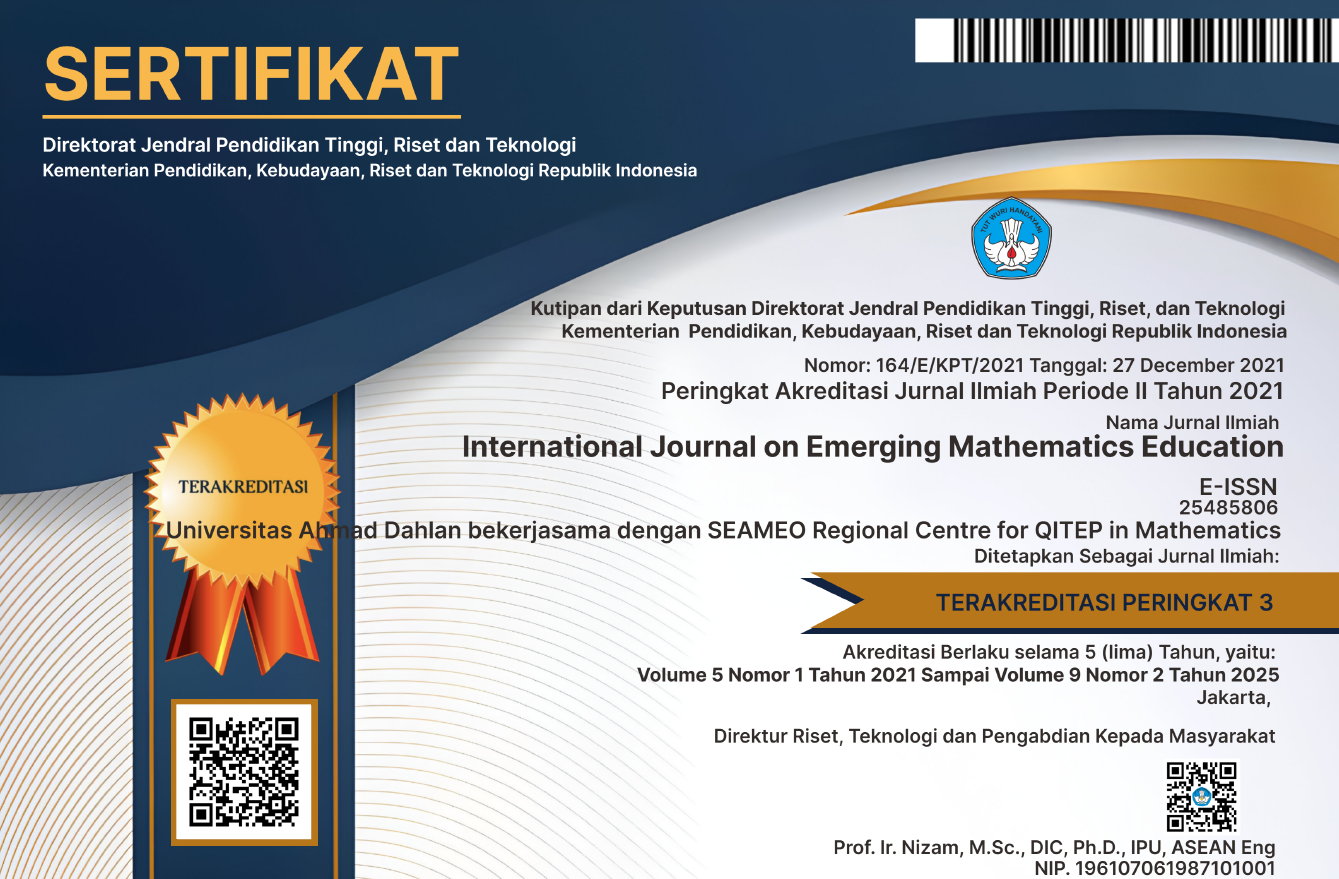Prospective Elementary Teachers’ Knowledge of Comparing Decimals
DOI:
https://doi.org/10.12928/ijeme.v3i1.11314Keywords:
Anthropological Theory of the didactic, praxeologies, hypothetical teacher tasks, mathematical and didactical knowledgeAbstract
The aim of this study is to investigate prospective elementary teachers’ (PsETs) mathematical and didactical knowledge of comparing decimals. Thirty-two fourth-year PsETs from an elementary school teacher education study program in Indonesia participated in this study. Each PsET is asked to solve a mathematical task of comparing decimals presented in the hypothetical teacher task (HTT), and then the PsETs use their mathematical knowledge to build their didactical knowledge collectively (pairs). Their mathematical and didactic knowledge is analyzed based on the anthropological theory of the didactic, especially praxeology. The findings indicate that PsETs have various techniques to solve the comparing decimal task, but some of them find it difficult to explain those techniques.References
Bosch, M., & Gascón, J. (2006). Twenty-five years of the didactic transposition. ICME Bulletin, 58, 51-65.
Chevallard, Y. (2006). Steps towards a new epistemology in mathematics education. In Bosch, M. (Ed.) Proceedings of the IV Congress of the European Society for Research in Mathematics Education (p. 21-30). Barcelona, Spain: FUNDEMI-IQS. http://yves.chevallard.free.fr/spip/spip/IMG/pdf/Steps_towards_a_New_Epistemology.pdf
Durand-Guerrier, V., Winsløw, C., & Yoshida, H. (2010). A model of mathematics teacher knowledge and a comparative study in Denmark, France, and Japan. Annales de didactique et des sciences cognitives, 15, 147-172. https://mathinfo.unistra.fr/fileadmin/upload/IREM/Publications/Annales_didactique/vol_15/adsc15-2010_006.pdf
Hardy, N. (2009). Students’ perceptions of institutional practices: the case of limits of functions in college level Calculus courses. Educational Studies in Mathematics, 72(3), 341. https://doi.org/10.1007/s10649-009-9199-8
Hill, H.C., Rowan, H.B., & Ball, D.L. (2005). Effects of teachers’ mathematical knowledge for teaching on student achievement. American Educational Research Journal, 42(2), 371-406. http://lmt.soe.umich.edu/files/hillrowanball.pdf
Irwin, K.C. (2001). Using everyday knowledge of decimals to enhance understanding. Journal for research in mathematics education, 32(4), 399-420. http://jwilson.coe.uga.edu/EMAT7050/articles/Irwin.pdf
Kuntur, M., Baumert, J., Voss, T., Klusmann, U., Richter, D., & Hachfeld, A. (2013). Professional competence of teachers: effects on instructional quality and student development. Journal of Educational Psychology, 105(3), 805-820. http://dx.doi.org/10.1037/a0032583
Ma, L. (1999). Knowing and teaching elementary mathematics: Teachers’ understanding of fundamental mathematics in China and the United States. Mahwah, NJ: Erlbaum.
OECD. (2015). PISA 2015 Results in Focus. Retrieved from https://www.oecd.org/pisa/pisa-2015-results-in-focus.pdf
Pramudiani, P., Zulkardi, Hartono, Y., & van Amerom, B. (2011). A concrete situation for learning decimals. Journal on Mathematics Education, 2(2), 215-230. https://doi.org/10.22342/jme.2.2.750.215-230
Putra, Z.H. (2018). A comparative study of Danish and Indonesian pre-service teachers’ knowledge of rational numbers (Doctoral dissertation), Copenhagen: University of Copenhagen. Retrieved from https://www.ind.ku.dk/begivenheder/2018/putra/Thesis_Zetra_Putra.pdf
Putra, Z.H. (2019). Elementary teachers’ knowledge on fraction multiplication: An anthropological theory of the didactic approach. Journal of Teaching and Learning in Elementary Education, 2(1), 47-52. https://dx.doi.org/10.33578/jtlee.v2i1.6964
Putra, Z.H., & Winsløw, C. (2018). Teachers’ collective knowledge: the case of equivalent fractions. Journal of Physics: Conference Series, 1088(1), 012003. https://doi.org/10.1088/1742-6596/1088/1/012003
RodrÃguez, E., Bosch, M., & Gascón, J. (2008). A networking method to compare theories: metacognition in problem solving reformulated within the Anthropological Theory of the Didactic. ZDM, 40(2), 287-301. https://doi.org/10.1007/s11858-008-0094-z
Shulman, L. S. (1986). Those who understand: Knowledge growth in teaching. Educational Researcher, 15(2), 4–14. https://doi.org/10.3102/0013189X015002004
Tatto, M.T., Rodriguez, M.C., Smith, W.M., Reckase, M.D., & Bankov, K. (2018). Exploring the Mathematical Education of Teachers Using TEDS-M Data. Switzerland: Springer International Publishing. https://doi.org/10.1007/978-3-319-92144-0
Tatto, M.T., Schwille, J., Senk, S., Ingvarson, L., Peck, R., & Rowley, G. (2008). Teacher Education and Development Study in Mathematics (TEDS-M): Policy, practice, and readiness to teach primary and secondary mathematics. Conceptual framework. East Lansing, MI: Teacher Education and Development International Study Center, College of Education, Michigan State University. https://msu.edu/~mttatto/documents/TEDS_FrameworkFinal.pdf
Widjaja, W., Stacey, K., & Steinle, V. (2008). Misconceptions about density of decimals: Insights from Indonesian pre-service teachers’ work. Journal for Science and Mathematics eEducation in Southeast Asia, 31(2), 117-131.
Winsløw, C., & Durand-Guerrier, V. (2007). Education of lower secondary mathematics teachers in Denmark and France. Nordic Studies in Mathematics Education, 12(2), 5-32. http://ncm.gu.se/pdf/nomadopen/12_2_005032_winslow.pdf
Downloads
Published
How to Cite
Issue
Section
License
License and Copyright Agreement
In submitting the manuscript to the journal, the authors certify that:
- They are authorized by their co-authors to enter into these arrangements.
- The work described has not been formally published before, except in the form of an abstract or as part of a published lecture, review, thesis, or overlay journal. Please also carefully read the International Journal on Emerging Mathematics Education (IJEME) Author Guidelines at http://journal.uad.ac.id/index.php/IJEME/about/submissions#authorGuidelines
- That it is not under consideration for publication elsewhere,
- That its publication has been approved by all the author(s) and by the responsible authorities, tacitly or explicitly, of the institutes where the work has been carried out.
- They secure the right to reproduce any material that has already been published or copyrighted elsewhere.
- They agree to the following license and copyright agreement.
Copyright
Authors who publish with the International Journal on Emerging Mathematics Education (IJEME) agree to the following terms:
- Authors retain copyright and grant the journal the right of first publication with the work simultaneously licensed under a Creative Commons Attribution License (CC BY-SA 4.0) that allows others to share the work with an acknowledgment of the work's authorship and initial publication in this journal.
- Authors are able to enter into separate, additional contractual arrangements for the non-exclusive distribution of the journal's published version of the work (e.g., post it to an institutional repository or publish it in a book), with an acknowledgment of its initial publication in this journal.
- Authors are permitted and encouraged to post their work online (e.g., in institutional repositories or on their website) prior to and during the submission process, as it can lead to productive exchanges, as well as earlier and greater citation of published work.
![]()
Ciptaan disebarluaskan di bawah Lisensi Creative Commons Atribusi-BerbagiSerupa 4.0 Internasional.




